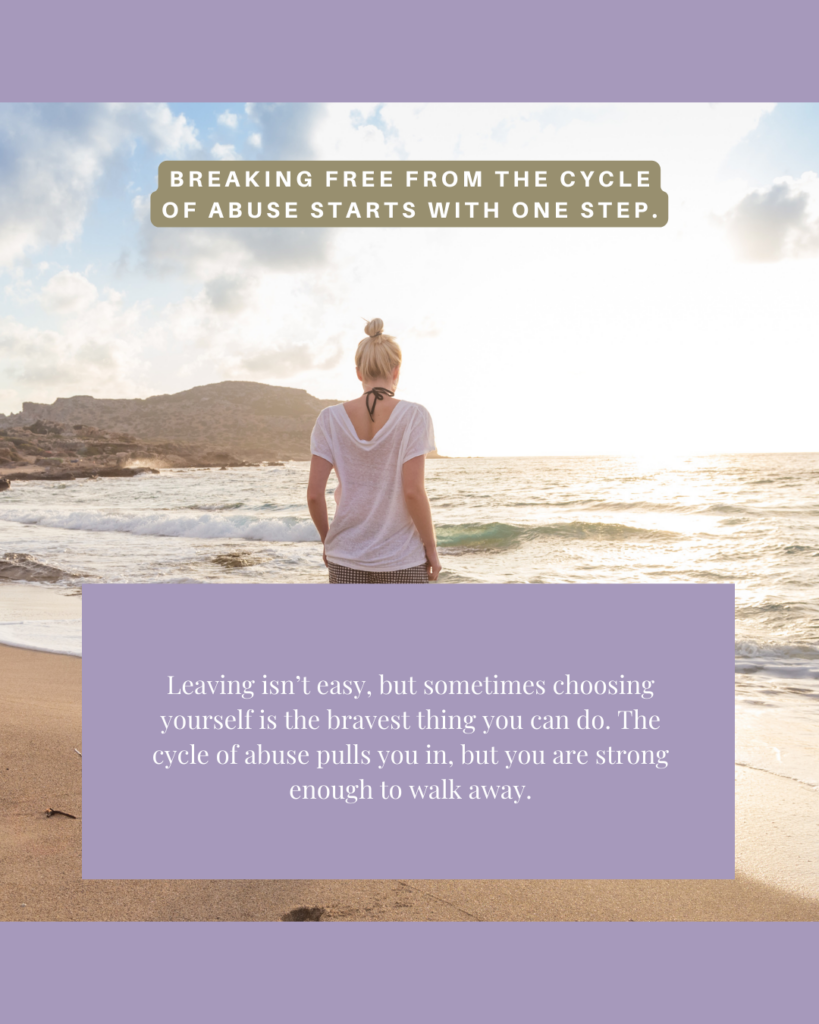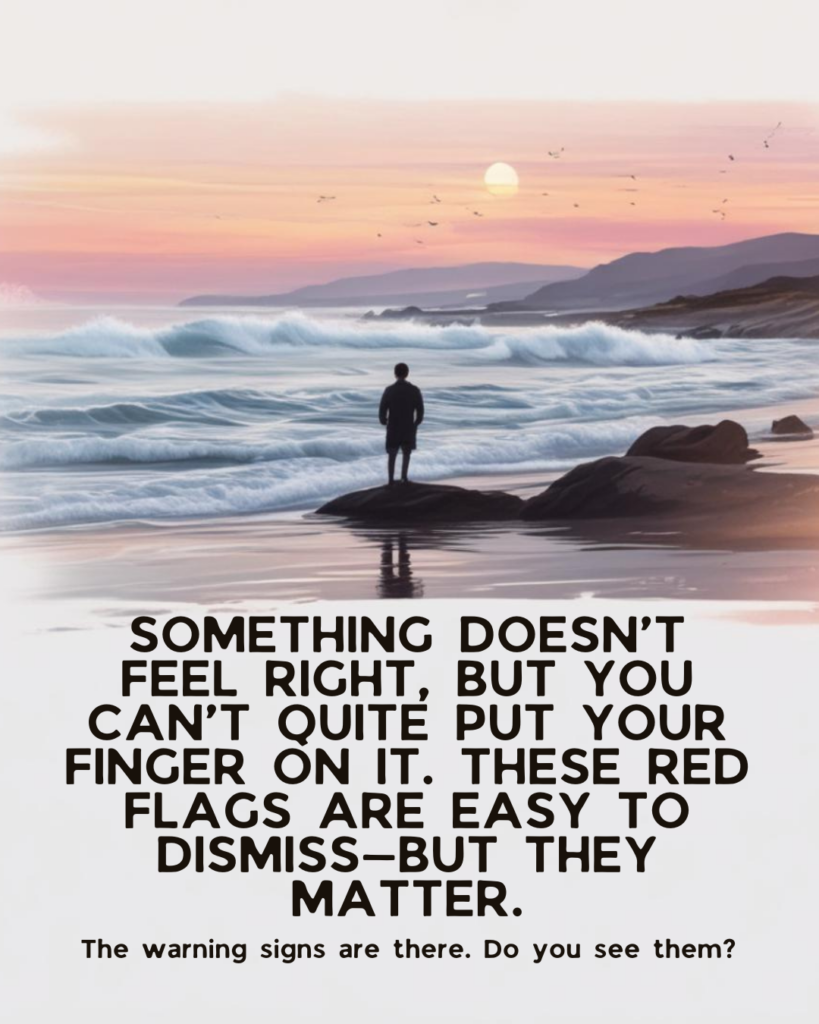Table of Contents Show
The cycle of abuse in relationships can be difficult to recognize. Have you ever thought you were in the perfect relationship…until suddenly, it wasn’t? That’s how mine felt. We met in college, we had classes together and swam on the swim team together. He was always around, showing up at my house or finding reasons to spend every minute together. It felt sweet at first like he really cared. But over time, it started to feel like I couldn’t get a moment alone. And when I did, he made me feel guilty—like I was letting him down.
It doesn’t always look like what you expect. What feels like love is, sometimes, is actually control, but you don’t see it right away. It starts out amazing, like everything you dreamed of, you hoped love would be. But slowly, it shifts.
It’s easy to wonder why people stay in unhealthy relationships, but the truth is, it’s not that simple. When you’re caught in the cycle, it’s designed to keep you confused and stuck.
When you know what to look for, the cycle of abuse becomes easier to spot. Here’s what the cycle of abuse looks like and how it can show up in teen and young adult relationships.

Love Bombing (Idealization) in the Cycle of Abuse
At first, everything feels perfect. He’s constantly texting you or FaceTiming late at night. He’s waiting for you after class, after an activity, or happens to show up where you are. He reacts when you post a picture, “Who’s that guy in the background?” or “Why didn’t you tell me you were going there?” It feels sweet like he cares, but soon, you realize you can’t breathe. If you make plans without him, he gets upset. You find yourself canceling on friends or changing your post just to avoid a fight.
Devaluation in the Cycle of Abuse
Then, something shifts. The same person who once adored everything about you starts making you question yourself. Suddenly, the little quirks they used to love are now ‘annoying’ or ‘immature.’ The teasing cuts deeper, and when you push back, they act like you’re overreacting. You start to wonder: Am I the problem?
Without realizing it, you begin changing. You stop wearing certain things, saying certain things, or hanging out with certain people just to avoid an argument. Bit by bit, you shrink yourself to fit what they want. But no matter how much you change, it’s never enough.
That’s how this phase works. The cycle of abuse is often subtle. It happens through small comments, little digs, and subtle looks that make you feel like you have to change to keep their love. The goal is control. They tear you down so you’ll stop trusting yourself—and rely on them instead. The same person who once adored everything about you starts making you question yourself. The little quirks they used to love are now ‘annoying’ or ‘immature.’ The teasing cuts deeper, and when you push back, they act like you’re overreacting. You start to wonder: Am I the problem?
Discard (Rejection) in the Cycle of Abuse
Then, one day, it feels like you don’t matter at all. He ignores your texts, leaves you on read, or blocks you. You see him at school, and he walks right past you like you don’t exist. Your stomach drops, and you replay every conversation, wondering what you did wrong. You just want things to go back to the way they were in the beginning. You tell yourself, “If I could just fix this, everything will be okay again.”
It feels like you did something wrong, but this is part of their control. Pulling away makes you chase them harder, exactly what they want.
Hoovering in the Cycle of Abuse
When you think you’re finally moving on, he pulls you back in. A random “I miss you” text. A song he sends that reminds you of your first date. A TikTok that brings up an inside joke. He promises it’ll be different this time. He says he’s sorry. And part of you believes him—because you miss the good times too.
But promises don’t mean change. Hoovering is named after the vacuum because that’s what they’re doing, sucking you back in. They need your attention and control more than they actually want to change.

Red Flags to Watch For If you’re wondering whether what you’re feeling is normal, here are a few red flags to look for:
- They always want to be with you and get upset if you make other plans.
- They don’t like you spending time with friends or family.
- They criticize what you wear, how you look, or your choices.
- They make you feel guilty when you say no.
- They ignore you or block you when they’re mad.
- They apologize but keep doing the same hurtful things.
For Parents, Teachers, and Trusted Adults, It can be hard to know what’s going on in a teen’s relationship, but here are some warning signs:
- They become anxious when they get a message from their partner.
- They stop spending time with friends and family.
- Their mood seems tied to their relationship.
- They seem constantly stressed or distracted.
What You Can Do For Teens & Young Adults:
- Talk to someone you trust—a friend, parent, teacher, or counselor.
- Set boundaries—in a healthy relationship, your partner respects your time, friends, and choices.
- It’s okay to leave. It doesn’t matter how long you’ve been together. You deserve to feel safe and respected.
For Parents & Trusted Adults:
- Keep the conversation open. Ask questions without judgment.
- Listen when they tell you something feels wrong.
- Offer support, but let them make the decisions.
Finally
Leaving is hard, even when you know you should. Even when they hurt you, you still remember the good times. You still love the person they were in the beginning. That’s what makes it so confusing. But sometimes, choosing yourself is the bravest and hardest thing you’ll ever do. You deserve that. You deserve love that doesn’t hurt.
If you don’t know who to talk to, start small. Text a friend. DM someone you trust. Or check out Love is Respect, you can even text them if talking feels too hard. If you need someone who gets it, reach out to me. My inbox is always open. You are not alone. You deserve love that doesn’t hurt.
More Books That Opened My Eyes:
- Dreamland by Sarah Dessen
- But I Love Him by Amanda Grace
- Breathing Underwater by Alex Flinn
- If He Had Been With Me by Laura Nowlin
- It Ends With Us by Colleen Hoover


